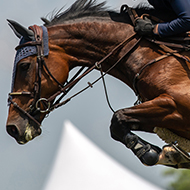
Equine sport leaders from across the globe attend virtual conference.
Some 200 horse sport leaders from around the world gathered on Thursday (13 Feb) to explore the reasons why well-intentioned individuals engage in poor welfare practices in horse sports.
In the virtual conference hosted by World Horse Welfare, four expert speakers explored the underlying dynamics within horse sport that can drive good people towards poor welfare practices, and offered solutions on how to change this.
The theme of the charity’s second annual conference was ‘Accountability for welfare in equestrianism: Looking beyond the obvious.’
Opening the conference, World Horse Welfare Chief Executive Roly Owers said: “It is easy to point the finger at one or two bad individuals – bad apples, we would like to think - in a world where most people love their horses and want to do the right thing.
“But it isn’t always as easy as deciding who are the bad people and who are the good people. These people have grown-up in a system. They have almost certainly normalised traditions, practices and attitudes that prevail in that system. So, are they solely to blame for their actions? Perhaps, when things go wrong for horses this is a symptom of a deeper issue.
“And as any good vet will tell you, if you are to be able to cure the symptoms you must find the cause."
The event looked at headlines of poor practice by individuals in horse sport, highlighting it as a symptom of systemic pressures that can lead some people to compromise the wellbeing of their equines.
Among the expert speakers included Sarah Powell, chief executive of British Gymnastics, whose insights into transforming an entire sport to prioritise the welfare of its athletes were particularly relevant to the challenges faced by equestrianism.
Attendees also heard from Mette Uldahl, national head veterinarian for the FEI in Denmark and expert on animal welfare and ethics; Tim Downes, chairman of the BHS Fellows Association and co-owner of Ingestre Stables and Meta Osborne, equine veterinarian, former board member of Horse Racing Ireland, Thoroughbred breeder and podcast host.
The speakers emphasised the need for better regulation and governance, and why everyone involved in horse sport must take responsibility for poor welfare practices.
Image (C) Shutterstock.



 The VMD has added anaphylaxis to the SPC of Solensia 7 mg/ml Solution for Injection for Cats.
The VMD has added anaphylaxis to the SPC of Solensia 7 mg/ml Solution for Injection for Cats.